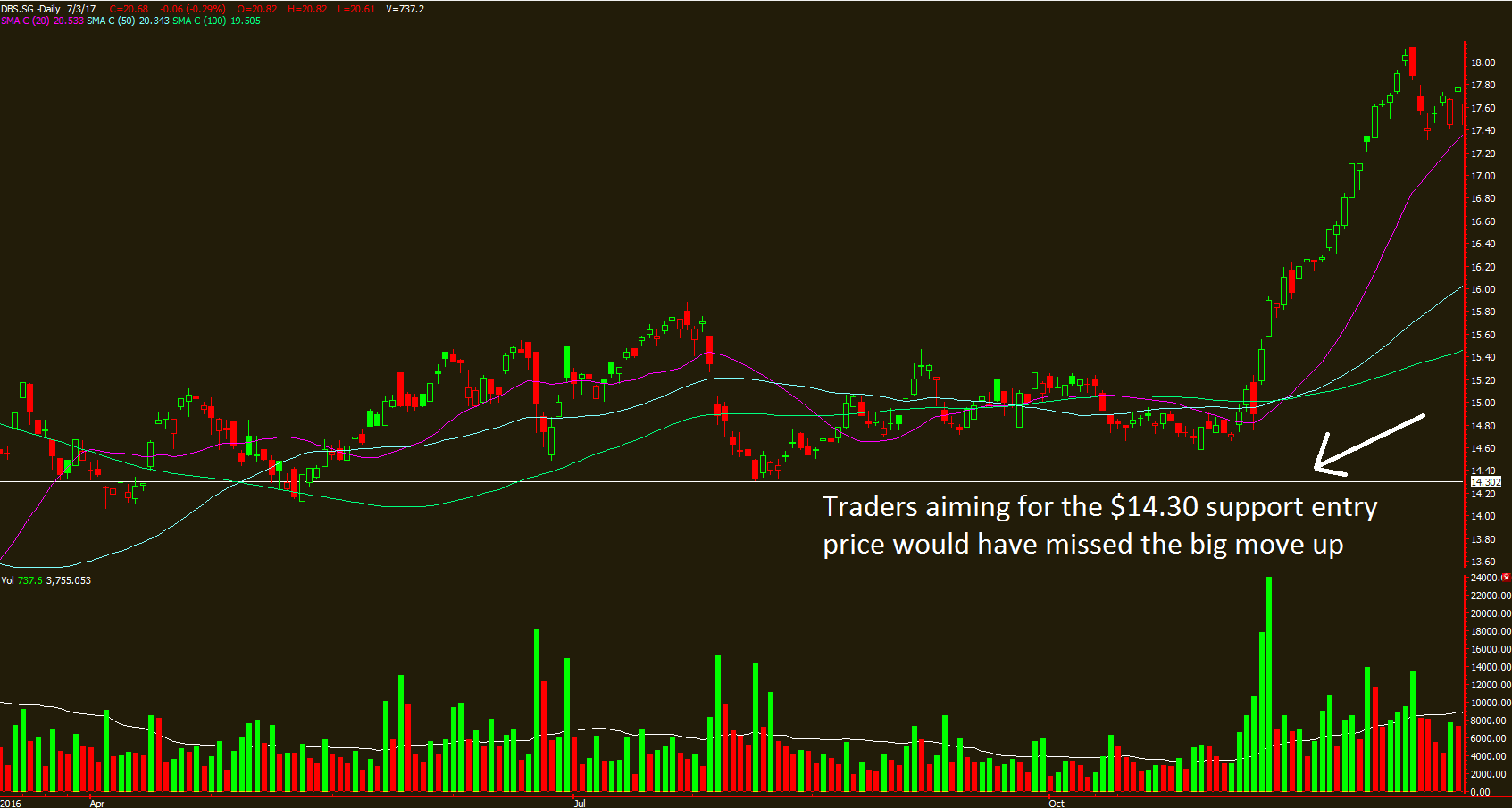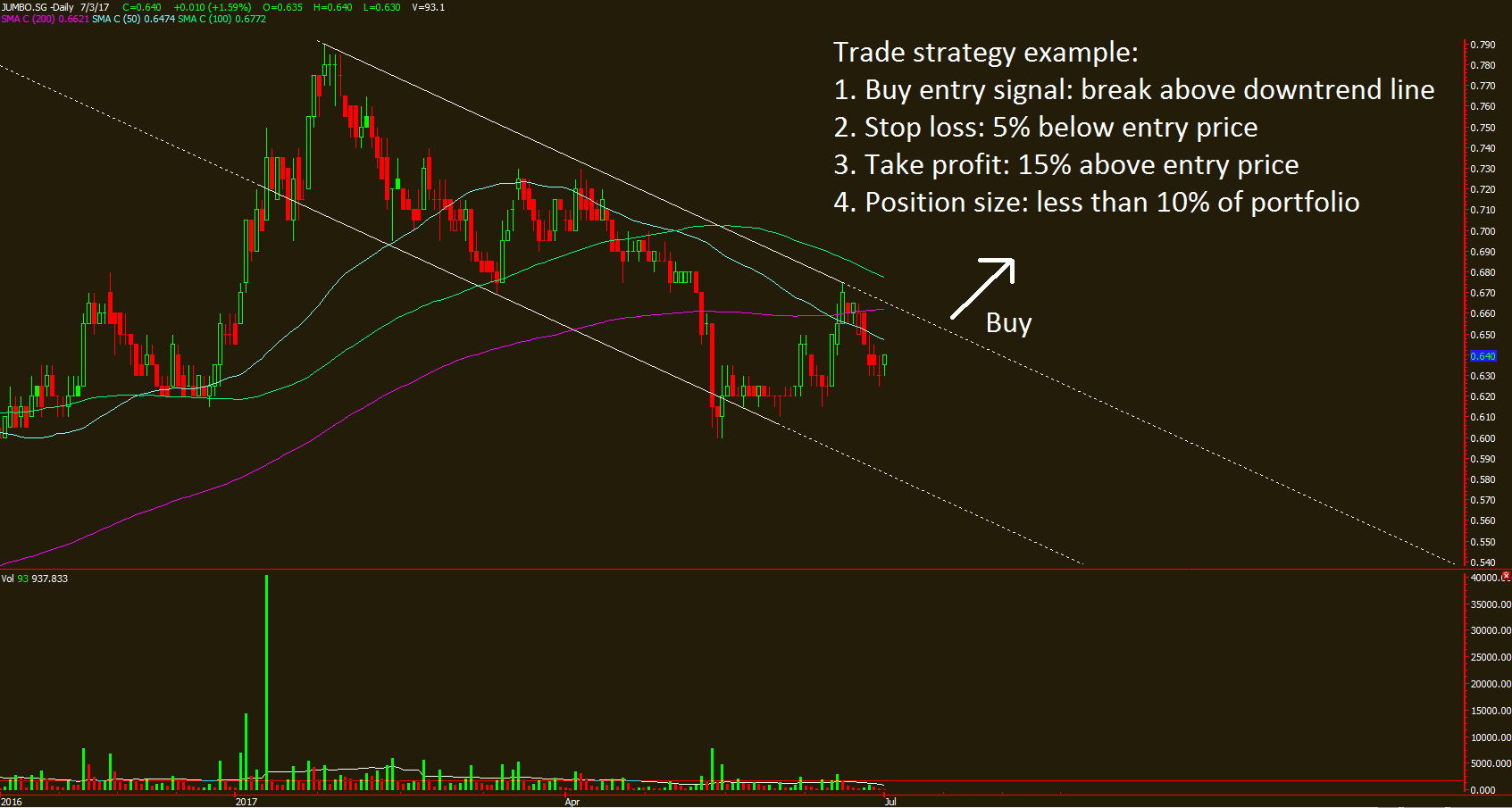2 ways to beat the fear of missing out July 7, 2017
As market participants, we all share the experience of missing out on a trade, be it because prices did not hit our entry target, or because we were too afraid to place the trade. We have all felt the frustration and the desire to kick ourselves for not entering the trade before the big move, especially when we had predicted it beforehand. Many traders fear this frustration, leading to them placing impulsive and irrational trades in an attempt to prevent themselves from ever missing out on a trade again. Often this results in overtrading, inconsistent profits and sometimes devastating losses.
Chart 1: Missing out
 Source: NextView Chart, DBS daily chart
Source: NextView Chart, DBS daily chart
For example, investors looking to enter DBS at $14.30 would have missed the big move up.
So is it a question of whether we should queue for our entry price or whether we should try chasing stocks that we missed? I believe it all comes down to trader psychology. Here are 2 things we can use to tackle the fear of missing out.
1. Have a clearly defined trading system / strategy
Every professional trader has a plan or a set of rules they adhere to when trading. It could be a strategy to only buy at support and sell at resistance, or a strategy that utilizes indicators like Stochastics and RSI. A trading strategy gives a trader clear guidelines and directions to success, and more importantly helps separate emotions from trading. Keeping our emotions in check will help prevent impulsive trades due to fear of missing out and secure a trader’s survival and success in the market.
Chart 2: Trading strategy example
 Source: NextView Chart, Jumbo daily chart
Source: NextView Chart, Jumbo daily chart
A clearly defined trading system / strategy helps to keep emotions out of your trades and provides guidelines on whether to buy or sell. You may customize your own trading rules to your liking.
Table 1: Examples of trading rules
| Never lose more than 10% in one trade |
| Always have a stop loss |
| Never buy at resistance |
| Only buy when RSI is oversold |
But what if you miss out on a trade because it did not fulfil your trading rules? We then come to the second and more important point.
2. Consistency is key
The frustration of missing out is often the number one cause of traders breaking their trading rules. While breaking your trading rules may result in occasional short-term profits, consistency will be compromised. In the long run, traders should aim for consistency rather than one-off home runs.
Sticking to your trading rules might be difficult at times. This is where a trading buddy or community might be able to assist you. Keeping a trading journal recording your thoughts and reasoning for your trades is another useful way of keeping a steady head when you’re thinking of breaking your rules.
By sticking to your trading rules, you will be able to develop your trading psychology and discipline over time, which ultimately distinguishes a good trader from an amateur.
Summary
Every trader experiences the fear of missing out. Some succumb to it and suffer heavy losses through impulse and irrational trading. It is vital that traders recognize this weakness, and through properly defining trading rules and consistency adhering to them will their trading psychology mature and subsequent profits be consistently achieved.
If you wish to know more information about stocks, you can speak to your designated Trading Representatives or a Dealer at a Phillip Investor Centre near you.
Disclaimer
These commentaries are intended for general circulation. It does not have regard to the specific investment objectives, financial situation and particular needs of any person who may receive this document. Accordingly, no warranty whatsoever is given and no liability whatsoever is accepted for any loss arising whether directly or indirectly as a result of any person acting based on this information. Opinions expressed in these commentaries are subject tIceberg Research strikes again with another Short Report o change without notice. Investments are subject to investment risks including the possible loss of the principal amount invested. The value of the units and the income from them may fall as well as rise. Past performance figures as well as any projection or forecast used in these commentaries are not necessarily indicative of future or likely performance. Phillip Securities Pte Ltd (PSPL), its directors, connected persons or employees may from time to time have an interest in the financial instruments mentioned in these commentaries. Investors may wish to seek advice from a financial adviser before investing. In the event that investors choose not to seek advice from a financial adviser, they should consider whether the investment is suitable for them.
The information contained in these commentaries has been obtained from public sources which PSPL has no reason to believe are unreliable and any analysis, forecasts, projections, expectations and opinions (collectively the “Research”) contained in these commentaries are based on such information and are expressions of belief only. PSPL has not verified this information and no representation or warranty, express or implied, is made that such information or Research is accurate, complete or verified or should be relied upon as such. Any such information or Research contained in these commentaries are subject to change, and PSPL shall not have any responsibility to maintain the information or Research made available or to supply any corrections, updates or releases in connection therewith. In no event will PSPL be liable for any special, indirect, incidental or consequential damages which may be incurred from the use of the information or Research made available, even if it has been advised of the possibility of such damages. The companies and their employees mentioned in these commentaries cannot be held liable for any errors, inaccuracies and/or omissions howsoever caused. Any opinion or advice herein is made on a general basis and is subject to change without notice. The information provided in these commentaries may contain optimistic statements regarding future events or future financial performance of countries, markets or companies. You must make your own financial assessment of the relevance, accuracy and adequacy of the information provided in these commentaries.
Views and any strategies described in these commentaries may not be suitable for all investors. Opinions expressed herein may differ from the opinions expressed by other units of PSPL or its connected persons and associates. Any reference to or discussion of investment products or commodities in these commentaries is purely for illustrative purposes only and must not be construed as a recommendation, an offer or solicitation for the subscription, purchase or sale of the investment products or commodities mentioned.
About the author

Mr Timothy Ang
Equity Dealer
Mr. Timothy Ang currently provides dealing services to over 10,000 trading accounts and is part of the POEMS Dealing, the core in-house dealing department of Phillip Securities Pte Ltd. Timothy’s investment methodology uses a combination of Fundamental and Technical Analysis, focusing on strong companies that show future promise. Apart from his dealing role, he often provides training seminars on Fundamental and Technical Analysis topics to further enrich his clients’ financial knowledge. Timothy holds a Bachelor Degree of Accounting and finance from the University of Western Australia.

 Back in Business: The Return of IPOs & Top Traded Counters in March 2024
Back in Business: The Return of IPOs & Top Traded Counters in March 2024  From $50 to $100: Unveiling the Impact of Inflation
From $50 to $100: Unveiling the Impact of Inflation  How to soar higher with Positive Carry!
How to soar higher with Positive Carry!  Why 2024 Offers A Small Window of Opportunity and How to Position Yourself to Capture It
Why 2024 Offers A Small Window of Opportunity and How to Position Yourself to Capture It 









